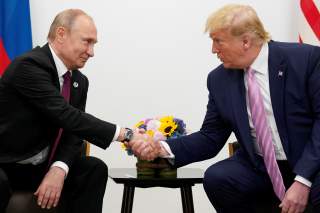How Trump Can Avoid War with Russia
Our Russia challenge does not fit neatly into either the “offensive Russia” or “defensive Russia” schools of thought, but the tangled set of issues crisscrossing the U.S.-Russian relationship does reflect the complexities of a classic wicked problem.
But America recently has become infected with an acute sense of internal vulnerability, gripped by fears that Russian propaganda might mesmerize American voters and that Russian intelligence might coopt the American presidency itself. This lack of confidence is playing an important role in distorting American perceptions of the Russian threat and increasing the dangers of escalatory spirals. Projecting America’s internal problems onto its perceptions of Russia is, in fact, a longstanding Western tendency. In his classic study of U.S. and European views of Russia over the centuries, historian Martin Malia observed that
Russia has at different times been demonized or divinized by Western opinion less because of her real role … than because of the fears and frustrations, or the hopes and aspirations, generated within European society by its own domestic problems.
Westerners have too often, he said, “produced our images of Russia out of ourselves.” To no small degree, that is as true today as it was during the eighteenth and nineteenth centuries.
Addressing this growing self-doubt will be no easy matter. It will require grappling with the problems of economic inequality, political partisanship and societal fragmentation that began plaguing America long before the 2016 election. And looming in the background is a disturbing question: Can America’s deep-rooted political tradition of constrained government meet the new challenges posed by the loss of institutional authority within atomized and disaffected societies, not only in the West, but increasingly across the world?
George Beebe is Vice President and Director of Studies at the Center for the National Interest, and former head of Russia analysis at the Central Intelligence Agency. This article was adapted from his book, The Russia Trap, with the permission of Thomas Dunne Books, an imprint of St. Martin’s Press.
Image: Reuters

